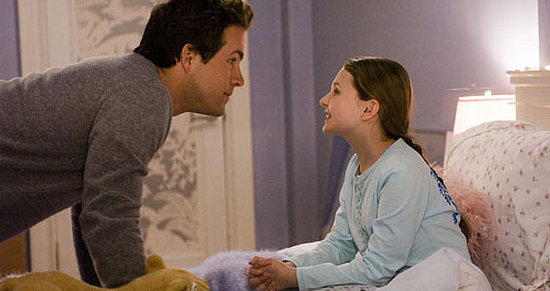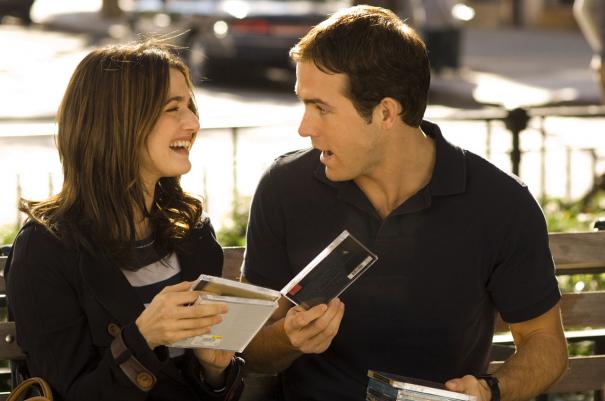2.5 stars (out of 5)
by R. Kurt Osenlund
During the opening credits of Definitely, Maybe, New York ad exec Will Hayes (Ryan Reynolds) is walking across town to pick up his 10-year-old daughter from school to the tune of Sly and the Family Stone’s “Everyday People”. In voiceover, Will says it’s the perfect song for the day. This whole movie plays like a mix tape, except the song that’s meant to be its theme rings the least true, keeping the manipulative romantic dramedy (written and directed by habitual romantic dramedy scribe Adam Brooks, of Wimbledon and Bridget Jones 2 fame) stranded in less-than-perfect territory.
Will has little cause for a carefree stroll. He’s got a job he doesn’t like, he’s just been informed that his wife has filed for divorce, and when he arrives to greet little Maya (Little Miss Sunshine’s Oscar nominee Abigail Breslin) she starts probing him with uncomfortable questions because she’s just learned about sex. It’s no accident that the movie incorporates this comedic element, because Maya’s about to be exposed to many more adult themes for which she’s developmentally unprepared. When they arrive back at Will’s apartment, Maya persuades him to tell her the story of how he and her mother first met, seeing as their lives are about to drastically change. Will agrees, but with a catch: he’ll tell her the details of his life at the time of their meeting, throw in two other women, change the names, and leave it up to Maya to deduce which one is her mom, in a type of late-night, mystery bedtime story.

So begins Definitely, Maybe’s overly-twisted pretzel of plotlines. We travel back to Will’s glory days as a twenty-something, aspiring politician making his debut on the Clinton campaign in early ‘90’s Manhattan. He’s left his college sweetheart Emily (which is, of course, not her real name) behind in Wisconsin to pursue his dream, which starts off with less-than-glamorous assignments like changing the toilet paper in the office bathroom and making coffee runs. Amidst his travails, he comes to know April (Wedding Crashers’ Isla Fisher), the office copy girl who claims to shun politics altogether, and Summer (The Constant Gardener’s Oscar winner Rachel Weisz), a sophisticated journalist with a not-so-secret connection to Emily (Heights’ Elizabeth Banks). The love quadrangle that forms around these four characters is the real meat of the movie, yet it’s inexplicably given second billing, and it’s constantly skating on thin ice.
Throughout the backstory, our cinema subconscious needs to continually remind us that these very grown-up details of the formative years of this man’s life are being conveyed to a 10-year-old girl. The movie is never inappropriate, nor should it be, but the topics being covered (politics, literature, lesbian experimentation, promiscuity) are simply too mature for Maya’s ears – sex-ed. or no sex-ed. We learn in breaks (of which there are so few that we sometimes forget Maya is even a part of the film, let alone an integral one) that Will has dumbed-down certain aspects of his reminiscence to make them more kid-friendly, but the awkward feeling of accompanying a minor to an adult show is unavoidable.

In a key scene that takes place near the ending, Will shows up at the doorstep of one of his three love interests with his daughter in tow. When the woman Will’s visiting realizes who he has with him, she casually states that it’s unfair, and that she won’t be able to react appropriately in the presence of his child. The moment basically sums up the discomfort the audience feels throughout the entire duration of Definitely, Maybe. Abigail Breslin is a bright, young ingénue with a very promising future, but she basically has no place in this film (which is a heavy blow to its success, since it tries to use the father-daughter relationship as its driving force). It uses her as a ploy to gain viewers’ good graces, just as Will uses her character as a way to reflect on his own youth. Why else would we learn what we do? The reflection begins as a tricky way for Maya to discover the origins and true identity of her mother, but quickly becomes a chronicle of the self-indulgent origins of Will’s unhappiness. And when the ultimately inconsequential “mystery” of the mother’s identity is revealed, there’s really no more reason for Maya’s presence, but she still sticks around.
The movie’s salvation is its easy-to-love cast. Reynolds is, admittedly, a bit flat here, but he continues to build on that leading man charisma he originated with 2002’s frat-boy farce Van Wilder. Breslin, as mentioned, is good, just out of place. Fisher finally seems to be shedding the goofball, Crashers exterior that brought her onto the scene, to reveal the tried-and-true actress underneath. Weisz – with her exquisitely high-brow demeanor – was the perfect choice to play the go-getting Summer, and scene-stealer Banks uses her role to inch that much closer to household name status. Even the great Kevin Kline makes a cameo as a horny college professor/novelist, but again, it’s not an element you’d share with an innocent pre-teen.
Definitely, Maybe tries to be many things. There are shades of Sleepless in Seattle, in which a child does the leg work in setting up his father with his one true love; as well as The Princess Bride, which has an old man telling his grandson a story, and the kid dictating where the story goes. The difference is, those movies don’t try to manipulate the children within them, or their audience, and the children within them actually play crucial roles. Try to imagine an adult-contemporary soundtrack with a Disney song thrown in here and there to inspire sentiment. That’s kind of what it feels like watching this film.


No comments:
Post a Comment